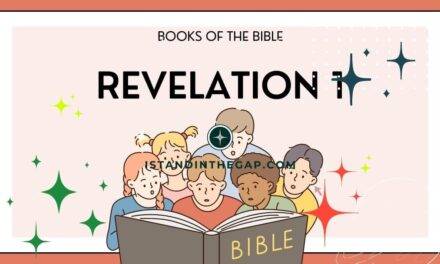The Book of Ecclesiastes may seem like a bleak and hopeless reflection on the emptiness of life, but it actually offers profound insights that point us toward Christ. In this “How Ecclesiastes Points to Christ”, we will unravel that.
Throughout the book, we see the author’s struggle to find meaning and purpose in life, only to ultimately conclude that true fulfillment can only be found in a relationship with God.
This theme of seeking after something greater than oneself ultimately foreshadows the ultimate fulfillment found in Christ.
Key Takeaways on How Ecclesiastes Points to Christ:
- The Book of Ecclesiastes is a search for the meaning of life and ultimately leads to the conclusion that true fulfillment can only be found in Christ.
- The Gospel can be found in the Old Testament by identifying threads of God, rebellion, rescue, and restoration, and understanding God’s ultimate plan for salvation through Christ.
- Ecclesiastes highlights the futility of life “under the sun” and the promise of restoration through Christ, ultimately pointing readers to the hope of eternal life in Him.
Continuing through the book, we see various illustrations of the momentary nature of life and the emptiness of pursuing worldly pleasures.
This serves not to discourage us, but rather to point us toward the joy and fulfillment found in a life dedicated to God’s purposes. As followers of Christ, we are called to reject the empty pursuits of this world and instead pursue a life of righteousness and service to God.
It is important to note that the author of Ecclesiastes lived before the coming of Christ, and thus the direct references to him are not present. However, the underlying themes of seeking after something greater and rejecting worldly pleasures are central to the Christian faith, and thus this book remains a powerful guide for those seeking to follow Christ.
In understanding the history behind the book, we see that it was likely written by King Solomon at the end of his life, as he looked back upon the emptiness he felt despite his great wealth and accomplishments.
This personal reflection highlights the universality of the book’s message, as even the wisest and most accomplished among us can ultimately find fulfillment only in God.
Understanding the Book of Ecclesiastes
The Book of Ecclesiastes is a complex piece of literature that offers unique insights into life, death, and everything in between. It is a spiritual exploration of the meaning of existence and how we can make our time on Earth worthwhile.
By examining the themes in Ecclesiastes, we can gain a deeper understanding of what the book is trying to convey. For instance, it highlights the importance of having a relationship with Christ and how it can bring true meaning and purpose to our lives.
Overall, understanding the Book of Ecclesiastes can help us make better decisions and live fulfilling lives.
Defining the Gospel
Explaining the Essence of the Gospel
The gospel is the message that encompasses God’s plan for humanity’s salvation through faith in Jesus Christ. The book of Ecclesiastes points us to Christ by emphasizing the futility of life without the hope and redemption that only He can offer. Understanding the gospel requires acknowledging our fallen nature, recognizing Jesus as the only way to salvation, and accepting His sacrifice as payment for our sins.
Jesus’ death and resurrection provide access to eternal life and forgiveness of sins for all who believe in Him. Ecclesiastes highlights the ultimate emptiness and transience of material pursuits and invites us to turn our hearts toward Christ, who offers eternal hope and purpose. By embracing the gospel, we can experience true fulfillment and meaning in life, both in this world and the next.
Moreover, Ecclesiastes compels us to repent and seek God’s forgiveness, emphasizing the limitations of human wisdom and the need for divine guidance. The gospel offers a path to redemption and an invitation to join God’s kingdom through faith in Christ.
It is a fact that the gospel is a message of hope that transcends temporal pleasures and provides a pathway to eternal fulfillment. (Source: 1 Peter 1:3-9)
Finding the Gospel in the Old Testament
The Old Testament is replete with references and foreshadowing of the Gospel, which is the good news of salvation through faith in Jesus Christ. Although it may not be explicit, the Old Testament continually points to the coming of our Lord and Savior. The book of Ecclesiastes is one of the Old Testament books that foreshadows Christ’s coming. It highlights the vanity of life without God and offers wisdom regarding true meaning and purpose. This insight is valuable in finding the Gospel in the Old Testament.
Ecclesiastes demonstrates the futility of relying solely on worldly pleasures and how emptiness can be filled by seeking God. As we read Ecclesiastes through the lens of the Gospel, we can see how it sets the groundwork for the coming of Christ, who gives eternal satisfaction and can fill the void in our lives. The book portrays how temporary earthly pleasures come up short, and only the love of Christ can provide true fulfillment.
It is worth delving into the Old Testament to better understand the significance of the Gospel in the Bible’s entirety. Ecclesiastes shows us that our lives are nothing without God and how Christ’s coming is the ultimate answer to our deepest longings. Understanding this can deepen our relationship with God and our appreciation for Christ’s work on the cross. So, invest time to discover the Gospel in the Old Testament and the rich wisdom that has been passed down for generations.
Searching for the Gospel in Ecclesiastes
The Gospel in Ecclesiastes reveals Christ. Discerning the hidden meaning within this Old Testament book requires the illumination of the Holy Spirit, connecting life’s fleeting nature with Christ’s redemption. Therefore, seeking Christ in Ecclesiastes is necessary for true spiritual awakening.
By contemplating the book’s message, Christians can recognize and appreciate life’s blessings and pitfalls as they point to Christ. Following Christ, the source of truth, is the ultimate solution to life’s futility, as illustrated by the book of Ecclesiastes.
Ecclesiastes points to Christ as the ultimate solution to life’s perplexities. Vanity of vanities is a phrase commonly used in the book, which emphasizes life’s transient and meaningless nature, but by examining the context of Ecclesiastes, the purposeless idea of life is redirected towards discovering Christ.
Additionally, Ecclesiastes is full of contradictions and paradoxes, such as life and death, love and hate, and war and peace. These seemingly incompatible situations highlight the significance of the gospel and Christ’s redemption.
Through Ecclesiastes, Christ’s redemptive power is introduced as the answer to life’s challenges. Made clear by Solomon, Ecclesiastes reveals the inescapable nature of man’s flaws and the emptiness of attempting to remedy the soul by human means.
Solomon, the author of Ecclesiastes, possessed wisdom from God, a skillful teacher, and a contemplative researcher. Even so, Ecclesiastes describes him as journeying through life, acknowledging the difficulties of discovering meaning and purpose. Thus, Ecclesiastes emphasizes the significance of seeking Christ as the answer to all of life’s dissonances.
According to an article titled ‘How Does the Book of Ecclesiastes Point Us to Christ?‘ by Brentley Jordan, discovering Christ in Ecclesiastes is essential for flourishing spiritually.
Evolution from Gen 1-2 to Ecclesiastes and beyond
The development from Genesis 1-2 to the Book of Ecclesiastes reveals the evolving nature of human understanding of God and the world. Below is a table depicting the significant differences between these two books.
| Genesis 1-2 | Ecclesiastes |
|---|---|
| Depicts a perfect world created by God | Explores the world’s challenges and futility |
| Emphasizes humanity’s intrinsic goodness | Acknowledges humanity’s fallen nature |
| Emphasizes humanity’s dominion over creation | Emphasizes the limitations and fleeting nature of life |
| Focused on God’s plan and intentions for humanity | Focuses on the meaninglessness of earthly pursuits |
Beyond Ecclesiastes, the Old Testament continues to explore humanity’s relationship with God and the world as believers developed a deeper understanding of God’s character and purposes.
To gain a richer understanding of the Scriptures, readers should embrace the evolving nature of human understanding and engage with the Bible’s full breadth and context. Doing so will lead to a deeper connection with God and a more meaningful life.
Ecclesiastes and how it points to Christ Chapter by Chapter
Chapter 1: The Vanity of Life and the Grief of Wisdom
In this chapter, the author reflects on the brief nature of human endeavors and the endless cycle of life. He introduces the recurring theme of “vanity” or “meaninglessness.” While human wisdom may bring insight, it can also bring grief when confronted with the limitations of understanding life’s mysteries.
This introspective chapter prompts us to consider the temporary nature of our pursuits and seek deeper meaning beyond the temporal.
How this points to Christ:
In Ecclesiastes 1, the acknowledgment of life’s fleeting nature and the search for meaning resonates with Christ’s teachings about the eternal significance of spiritual pursuits over materialism.
- Jesus emphasized storing treasures in heaven rather than on earth (Matthew 6:19-21) and urged his followers to seek God’s kingdom and righteousness above all else (Matthew 6:33).
- This chapter’s exploration of the limitations of human wisdom also points to the need for the ultimate wisdom found in Christ (1 Corinthians 1:30).
Chapter 2: The Vanity of Pleasure and the End of the Wise and the Fool
The author continues his exploration of vanity, now focusing on pleasure and accomplishment.
Here, he describes his pursuit of pleasure, wealth, and grand projects, yet ultimately finds them all empty. He highlights the inevitability of death that awaits both the wise and the fool, rendering their achievements meaningless in the grand scheme.
How this points to Christ:
Ecclesiastes 2 reflects Christ’s teachings on the futility of accumulating wealth and earthly pleasures at the expense of spiritual growth.
- Jesus warned against storing up treasures on earth but encouraged seeking treasures in heaven (Matthew 6:19-21).
- Additionally, the chapter’s emphasis on the universality of death and the fleeting nature of worldly pursuits aligns with Christ’s call to focus on eternal matters and the salvation of the soul (Matthew 16:26).
Chapter 3: Everything Has Its Time vs The God-Given Task and Injustice Seems to Prevail
This chapter introduces the famous passage about “a time for everything.” The author contemplates the ordered cycles of life and emphasizes that God has appointed each activity its time.
Yet, he grapples with the seeming injustice in the world, where the righteous often suffer while the wicked prosper.
How this points to Christ:
- Ecclesiastes 3’s focus on divine timing and God’s sovereign control over seasons echoes Christ’s role as the incarnate Son of God, sent at the appointed time for humanity’s salvation (Galatians 4:4-5).
- The theme of injustice and suffering finds its resolution in Christ’s sacrificial death, where He bore the injustices of the world to bring redemption and restoration.
Chapter 4: The Vanity of Selfish Toil vs The Value of a Friend and How Popularity Passes Away
The author laments the vanity of selfish toil and the isolation that can arise from pursuing personal gain. He emphasizes the value of companionship and the support of a friend.
He also reflects on the transient nature of popularity and the fleeting applause of the crowd.
How this points to Christ:
- Ecclesiastes 4’s discussion on the emptiness of selfish pursuits aligns with Christ’s teachings on selflessness and loving one’s neighbor as oneself (Matthew 22:39).
- Jesus emphasized the importance of unity and genuine community among believers (John 13:34-35), highlighting the value of true friendship.
- Additionally, the chapter’s recognition of the fleeting nature of popularity finds resonance in Christ’s humility and ultimate exaltation by God (Philippians 2:6-11).
Chapter 5: Fear God, Keep Your Vows, and The Vanity of Gain and Honor
The author emphasizes the importance of honoring vows made to God. He warns against making hasty vows and advocates for honest worship. He critiques the pursuit of wealth and the striving for honor, noting their inability to bring lasting satisfaction.
How this points to Christ:
- Ecclesiastes 5’s call to fear God and keep vows aligns with Christ’s teachings on genuine worship and obedience. Jesus emphasized worshiping God in spirit and truth (John 4:23-24) and fulfilling vows made to God (Matthew 5:33-37).
- The chapter’s critique of the pursuit of wealth and honor finds resonance in Christ’s teachings on the importance of laying up treasures in heaven and seeking God’s kingdom (Matthew 6:19-21, 33).
Chapter 6: There is an evil which I have seen under the sun
This chapter opens with a reflection on the suffering of those whom God has given riches and wealth but denies the ability to enjoy it. The author contemplates the futility of such a life, even as death is inevitable for all.
How it points to Christ:
- In Ecclesiastes 6, the exploration of the emptiness of wealth and the inability to find contentment in earthly possessions resonates with Christ’s teachings on the dangers of materialism. Jesus warned against placing one’s trust in wealth (Matthew 6:24) and emphasized the eternal value of investing in heavenly treasures (Matthew 6:19-21).
- The chapter’s recognition of the limitations of worldly abundance points to the need for finding true satisfaction in Christ alone.
Chapter 7: The Value of Practical Wisdom
The author turns his attention to the value of wisdom. He contrasts the wise and the foolish, highlighting the benefits of wisdom in navigating life’s complexities. He acknowledges that no one is without sin and that a humble and reverent approach to God is essential.
How it points to Christ:
- Ecclesiastes 7’s emphasis on the value of wisdom and humility aligns with Christ as the embodiment of wisdom and humility.
- In the New Testament, Christ is referred to as the wisdom of God (1 Corinthians 1:24) and exemplified humility by His incarnation and sacrificial death (Philippians 2:5-8).
- The chapter’s call to approach God with humility and reverence also echoes Christ’s teachings on humility and the recognition of one’s need for divine grace (Luke 18:9-14).
Chapter 8: Obey Authorities for God’s Sake · Death Comes to All
The author advises submission to authority and adherence to the king’s command. He acknowledges the mystery of divine justice, where the wicked may appear to prosper while the righteous suffer. He acknowledges that death is inevitable for all, whether righteous or wicked.
How it points to Christ:
- Ecclesiastes 8’s counsel on obeying authorities aligns with Christ’s teachings on rendering unto Caesar what is Caesar’s and unto God what is God’s (Matthew 22:21). Jesus emphasized obedience to God’s commands while also respecting earthly authorities.
- Additionally, the chapter’s recognition of the inevitability of death points to Christ’s resurrection and His triumph over death (1 Corinthians 15:55-57).
Chapter 9: Wisdom Superior to Folly
The author highlights the superiority of wisdom over folly, noting that wisdom is often ignored even though it offers protection. He acknowledges that time and chance affect everyone, and death is a common fate for all.
How it points to Christ:
- In Ecclesiastes 9, the emphasis on the value of wisdom resonates with Christ as the embodiment of wisdom.
- In the New Testament, Christ is referred to as the wisdom of God (1 Corinthians 1:24).
- The chapter’s acknowledgment of the unpredictable nature of life and the universality of death finds resonance in Christ’s teachings on being prepared for His second coming, which will come unexpectedly (Matthew 24:36-44).
Chapter 10: Dead flies putrefy the perfumer’s ointment, And cause it to give off a foul
This chapter opens with the imagery of dead flies spoiling perfumed ointment. The author reflects on the impact of foolishness and folly on a person’s reputation and leadership. He contrasts wisdom and foolishness.
How it points to Christ:
- Ecclesiastes 10’s emphasis on the impact of foolishness and the importance of wisdom aligns with Christ’s teachings on discernment and the pursuit of godly wisdom.
- Jesus warned against the consequences of foolishness and emphasized the importance of being wise as serpents and harmless as doves (Matthew 10:16).
- The chapter’s exploration of the influence of wisdom and folly on leadership and reputation underscores the significance of Christ as the ultimate example of wise leadership and virtuous character.
Chapter 11: The Value of Diligence · Seek God in Early Life
The author advises being proactive and diligent in various endeavors, even in the face of uncertainties. He encourages enjoying life but also reminds the youth of the importance of seeking God early in life.
How it points to Christ:
- Ecclesiastes 11’s counsel on diligence and the pursuit of meaningful work aligns with Christ’s teachings on using one’s talents and resources wisely (Matthew 25:14-30). Jesus emphasized the importance of investing in eternal matters and being good stewards.
- The chapter’s exhortation to seek God in early life resonates with Christ’s call to become like children and enter the kingdom of heaven with childlike faith (Matthew 18:3).
Chapter 12: The Whole Duty of Man
In this concluding chapter, the author provides a poetic reflection on the aging process and the inevitable decline of physical abilities. He advises remembering God in youth and offers a summary of life’s purpose: to fear God and keep His commandments. The chapter ends with a call to remember God before the days of old age arrive.
How it points to Christ:
- Ecclesiastes 12’s emphasis on the fear of God and the importance of keeping His commandments aligns with Christ’s teachings on the greatest commandments: to love God with all one’s heart, soul, and mind, and to love one’s neighbor as oneself (Matthew 22:37-39).
- Jesus reiterated the significance of obedience to God’s commandments (John 14:15) and taught that eternal life is found in knowing God (John 17:3).
- The chapter’s call to remember God before old age underscores the eternal value of a lifelong relationship with Him through Christ.
Conclusion: How Ecclesiastes points us to Christ and his promise of restoration.
Ecclesiastes offers insights into how Christ can restore and redeem our lives. By examining the fleeting nature of worldly pursuits and urging us to seek meaning in God, Ecclesiastes highlights our need for a higher purpose. Through Christ, we can find the restoration we long for and be renewed in our faith.
This book serves as a reminder that true meaning can only be found in God and that Christ offers us the promise of restored and abundant life. Don’t miss out on the opportunity to experience this transformation.
In summary, the book of Ecclesiastes offers a unique perspective on life’s complexities and challenges, pointing to Christ through its exploration of the human experience and the ultimate fulfillment found in God’s wisdom, purpose, and grace.
Through its themes of the vanity of worldly pursuits, the importance of wisdom, the inevitability of death, and the fear of God, Ecclesiastes ultimately directs our attention to Christ as the source of true meaning, fulfillment, and eternal hope.
Some Facts About How Does the Book of Ecclesiastes Point Us to Christ?
- ✅ Ecclesiastes is known as Wisdom Literature in the Old Testament. (Source: Team Research)
- ✅ The Preacher, believed by many to be King Solomon, goes on a quest for the meaning of life but concludes that everything is vanity of vanities. (Source: Team Research)
- ✅ Though Ecclesiastes may seem to have a sad message, it points to the fact that nothing “under the sun” can ultimately supply us with ultimate meaning and that everything is meant to point us to another world. (Source: Team Research)
- ✅ By understanding the gospel and its basic themes of God, humanity’s rebellion, God’s rescue, and our future restoration, we can find connections and fill out the gospel story in all parts of the Old Testament, including Ecclesiastes. (Source: Team Research)
- ✅ Ecclesiastes can be seen as pre-gospel work, as it highlights the quest for meaning and shows that only a fulfilling relationship with Christ can truly satisfy. (Source: Team Research)
FAQs about How Does The Book Of Ecclesiastes Point Us To Christ?
How does Ecclesiastes fit into the Gospel message?
Ecclesiastes can be viewed as pre-gospel work, as the Preacher’s quest for meaning mirrors the same quest that most humans find themselves on.
The message of Ecclesiastes is that nothing in this world will ever truly satisfy. All creation groans for redemption, and everything “under the sun” is meant to point us to another world beyond this one.
What is JI Packer’s definition of the Gospel?
According to JI Packer, the simplest definition of the Gospel is “God saves sinners.”
What are the four points of the “God-Man-Christ-Response” framework for presenting the Gospel?
The four points of the “God-Man-Christ-Response” framework are:
God’s character, humanity’s failure to meet God’s holy standard, judgment from God for this failure, and Jesus Christ’s fulfillment of what is required for salvation through his life, death, and resurrection. Our fitting response is to repent and have faith in Him, becoming united with Christ and his record.
What are the four points of the “Creation-Fall-Redemption-Glory” framework for presenting the Gospel?
The four points of the “Creation-Fall-Redemption-Glory” framework are God’s loving creation of humanity for rest, rule, and relationship; humanity’s rebellion and subsequent curse of disobedience; God’s sending of Jesus Christ to bear the curse and fulfill redemption; and ultimate restoration and living in a new heaven and a new earth.
How does C.S. Lewis’s “Mere Christianity” relate to the message of Ecclesiastes?
C.S. Lewis’s “Mere Christianity” and the message of Ecclesiastes both address the human longing for ultimate meaning and fulfillment. They argue that nothing in this world can fully satisfy our desires because we were made for another world. Ecclesiastes mirrors this sentiment through the Preacher’s quest for meaning and the realization that everything “under the sun” is ultimately vanity, while “Mere Christianity” offers the Christian solution of recognizing that we were made for another world and seeking ultimate satisfaction through faith in Christ.
What is the significance of the promise of a new heaven and a new earth?
The promise of a new heaven and new earth signifies ultimate restoration and fulfillment. In this new world, creation will be no longer groaning for redemption, and humanity will experience the blessings of obedience and the restoration of rest, rule, and relationship with God.

















